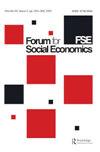The Illiberal Turn in Politics and Ideology through the Commodified Social Policy of the ‘Family 500+’ Programme
IF 1.2
Q4 ECONOMICS
引用次数: 2
Abstract
Abstract The specificity of political and economic changes in Central and Eastern Europe (CEE) over the past decade requires detailed theoretical analysis and in-depth empirical research. In particular, the so-called illiberal turn in politics and the accompanying economic reforms are of interest to social scientists. This article attempts to explain this turn in the context of social policy changes, based on the example of the Family 500+ programme in Poland during the rule of the populist political party Prawo i Sprawiedliwość (Law and Justice, or PiS). To demonstrate the instrumental role of this programme in the implementation of the illiberal strategy, the concept of the commodification of social benefits is used to shed new light on the specificity of Polish ‘pseudo-social welfare’. Hence, the main premise of this article is the thesis that the Family 500+ programme not only fails to constitute the foundation of the Polish welfare state, but, through the commodification of social relations and cuts within the de-commodified social services, it reinforces neoliberal economic forces and the importance of the state.从“家庭500+”计划的改良社会政策看政治和意识形态的非自由转向
摘要过去十年中东欧政治和经济变化的特殊性需要详细的理论分析和深入的实证研究。特别是,所谓的政治不自由转向以及随之而来的经济改革引起了社会科学家的兴趣。本文试图在社会政策变化的背景下,以民粹主义政党Prawo i Sprawiedliwość(法律与正义,简称PiS)统治期间波兰的家庭500+计划为例,解释这一转变。为了证明该方案在实施非自由战略方面的重要作用,社会福利商品化的概念被用来揭示波兰“伪社会福利”的特殊性。因此,本文的主要前提是,家庭500+计划不仅没有构成波兰福利国家的基础,而且通过社会关系的商品化和在去商品化的社会服务中的切割,它强化了新自由主义的经济力量和国家的重要性。
本文章由计算机程序翻译,如有差异,请以英文原文为准。
求助全文
约1分钟内获得全文
求助全文

 求助内容:
求助内容: 应助结果提醒方式:
应助结果提醒方式:


